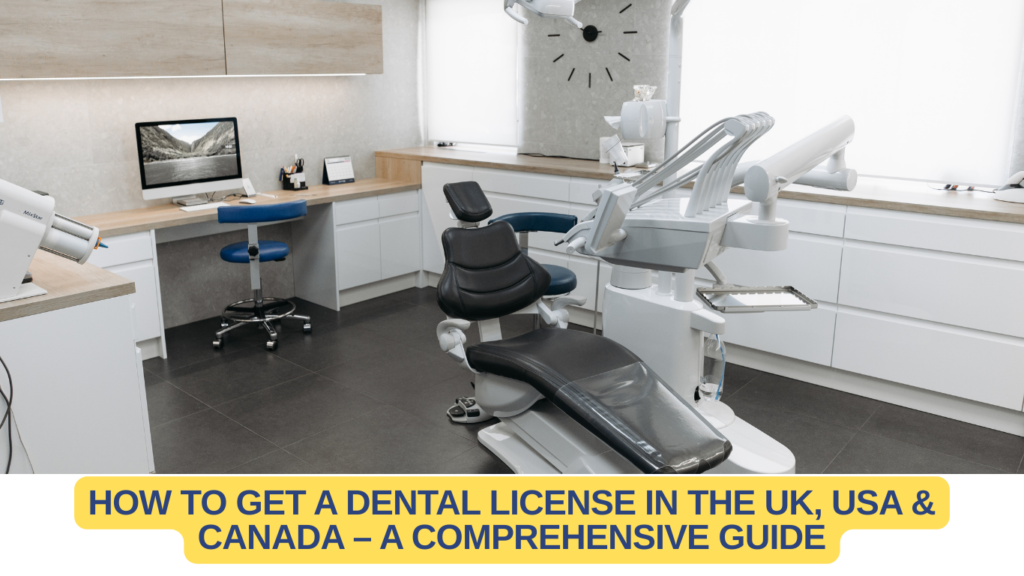If you are a foreign-trained dentist looking to practice in the UK, USA, or Canada, you must go through a licensing process that involves meeting eligibility criteria, passing specific examinations, and completing application procedures. This guide provides a detailed, step-by-step overview to help you navigate the licensing requirements efficiently and start your dental career in your desired country.
Dental Licensing in the UK
1. Eligibility Requirements:
- Foreign-trained dentists must have a recognized dental degree from an accredited institution.
- English language proficiency is mandatory, typically demonstrated through IELTS (minimum 7.0 in each component) or OET (Occupational English Test) with a Grade B.
2. Registration with the General Dental Council (GDC):
- Dentists must register with the GDC to practice legally in the UK.
- Registration requires submission of academic credentials, proof of English proficiency, and a valid work visa.
3. Overseas Registration Exam (ORE) or License in Dental Surgery (LDS):
- ORE Exam: Conducted in two parts – Part 1 covers theoretical knowledge, while Part 2 assesses clinical skills.
- LDS Exam: Conducted by the Royal College of Surgeons, an alternative to ORE, also in two parts.
- Candidates must complete both parts successfully before applying for full GDC registration.
4. Application Process:
- Pass the required examination (ORE or LDS).
- Submit required documents, including degrees, transcripts, proof of identity, and evidence of clinical experience.
- Pay the registration fees and apply for a license.
- Once approved, candidates can start practicing dentistry in the UK.
5. Additional Considerations:
- Dentists may need to complete an adaptation period or supervised work before full registration.
- NHS roles require additional training and compliance with NHS employment policies.

Dental Licensing in the USA
1. Eligibility Requirements:
- Foreign-trained dentists must have a degree equivalent to a US Doctor of Dental Surgery (DDS) or Doctor of Dental Medicine (DMD) from an institution accredited by the Commission on Dental Accreditation (CODA).
- English language proficiency is required, with TOEFL scores often mandated by dental programs.
2. National Board Dental Examination (NBDE) or Integrated National Board Dental Examination (INBDE):
- The INBDE has replaced the NBDE Parts I and II.
- The exam tests fundamental dental knowledge, including clinical and biomedical sciences.
3. Advanced Standing Programs:
- Many foreign-trained dentists must complete a two-year DDS/DMD advanced standing program at an accredited US dental school.
- These programs enhance clinical and theoretical knowledge and prepare candidates for state licensing exams.
4. State-Specific Licensing Requirements:
- Each US state has its own licensing board and requirements.
- Some states require additional clinical exams, such as:
- Western Regional Examining Board (WREB)
- Central Regional Dental Testing Service (CRDTS)
- Commission on Dental Competency Assessments (CDCA)
- Some states allow alternative pathways, such as residencies, in place of clinical exams.
5. Application Process:
- Complete the INBDE examination.
- Enroll and graduate from an advanced standing program, if required.
- Pass state board exams or clinical licensing tests.
- Submit all required documentation, including work authorization and educational credentials.
- Receive state licensure and begin practicing.
6. Additional Considerations:
- US dental licensure is state-specific; relocating requires obtaining a new license.
- Non-citizens may need sponsorship for work visas (H-1B or green card sponsorship).
Dental Licensing in Canada
1. Eligibility Requirements:
- Foreign dental degrees must be recognized by the National Dental Examining Board of Canada (NDEB).
- Proof of language proficiency (English or French) is required for certification.
2. NDEB Equivalency Process:
- Assessment of Fundamental Knowledge (AFK): Tests basic dental sciences and theoretical knowledge.
- Assessment of Clinical Judgment (ACJ): Evaluates diagnosis and treatment planning skills.
- Assessment of Clinical Skills (ACS): Tests hands-on clinical abilities.
- Candidates must pass all three assessments before moving to the certification stage.
3. NDEB Certification Process:
- Upon passing equivalency exams, candidates take the NDEB written examination and the Objective Structured Clinical Examination (OSCE).
- Successful candidates receive NDEB certification, allowing them to apply for a provincial license.
4. Provincial Licensing Requirements:
- Dental licensure in Canada is regulated at the provincial level.
- After receiving NDEB certification, candidates must apply for a license from the provincial regulatory body where they intend to practice.
5. Application Process:
- Complete NDEB equivalency and certification exams.
- Apply for provincial licensure with required documents (transcripts, proof of experience, and background check).
- Meet any additional province-specific requirements (e.g., jurisprudence exams, additional clinical training).
- Obtain certification and start practicing.
6. Additional Considerations:
- Some provinces may require additional clinical experience or mentoring programs before granting full licensure.
- International dentists may qualify for student visa programs that facilitate training and examination processes.
Final Thoughts
Obtaining a dental license in the UK, USA, or Canada requires significant preparation, financial investment, and dedication- the dental license Process may change from time to time, enquire & update. The process involves multiple examinations, document verification, and, in some cases, additional education. However, with the right approach and early preparation, foreign-trained dentists can successfully transition into a professional career in these countries. To setup clinic Essential Guide.
If you are considering practicing dentistry abroad, start by researching the licensing requirements of your chosen destination and planning for examinations well in advance. Seeking guidance from professional dental organizations and current practitioners can also be beneficial in navigating the complex licensing process.
